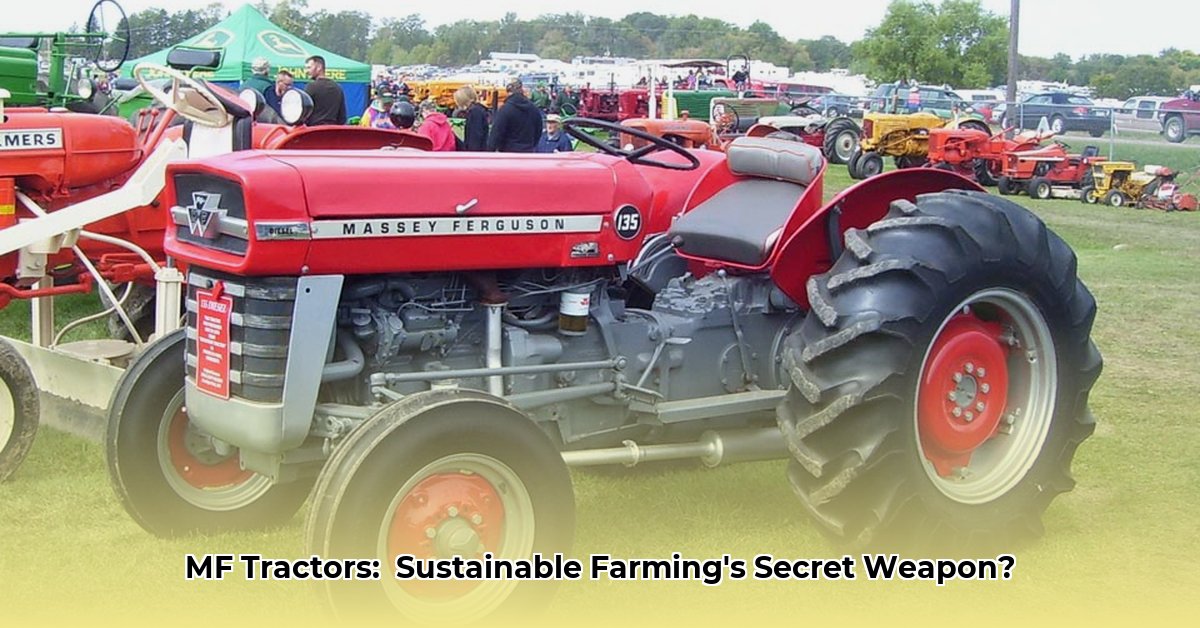
The 1970s witnessed a transformative shift in agriculture, with Massey Ferguson (MF) tractors playing a pivotal role. Models like the 135 and 165 became iconic symbols of increased efficiency, dramatically boosting harvest yields and reshaping global food production. However, the sustainability implications of these powerful machines remain a complex and nuanced topic, requiring a careful examination of their historical context and enduring legacy. This article analyzes the environmental impact of MF tractors from the 1970s, weighing their contributions to both progress and challenges in the pursuit of sustainable agricultural practices. For more information on Massey Ferguson tractors, see this helpful resource.
A Technological Revolution on the Farm
Massey Ferguson tractors of the 1970s represented a significant leap in agricultural technology. Increased horsepower enabled farmers to cultivate larger areas more quickly, resulting in higher yields and reduced labor costs. This mechanization was instrumental in meeting the growing global demand for food. Images of these robust machines, working tirelessly in fields, symbolize this era of increased agricultural productivity. However, this efficiency came with unforeseen environmental consequences that require scrutiny.
Fuel Efficiency: The Green Side of a Thirsty Machine
Compared to modern tractors, the fuel efficiency of 1970s MF models was considerably lower. They were undeniably "thirsty" machines. This high fuel consumption directly contributed to increased greenhouse gas emissions, a significant concern in the context of sustainable agriculture. However, the remarkable durability and longevity of these tractors must be acknowledged. Many remain operational today, reducing the need for frequent replacements and the associated environmental impact of manufacturing new machinery. This counterbalances the high fuel use to some degree, but the overall sustainability picture remains unclear and warrants further investigation. Did the longevity outweigh the fuel inefficiency? The answer needs a more detailed life-cycle analysis.
Built to Last, But for How Long?
The robust construction of 1970s MF tractors, while contributing to their long lifespan, also poses a sustainability challenge. The extended operational life, while reducing the need for frequent replacements, means continued fuel consumption and potential environmental impact for many years. This presents a complex trade-off: the initial reduction in manufacturing impact is balanced against prolonged operational emissions. The question remains: at what point does the continued use of less-efficient machinery outweigh the initial benefits of reduced manufacturing?
Keeping the Old Girl Running: Maintenance Matters
Maintaining a vintage MF tractor presents a unique set of challenges. Sourcing parts can be difficult and costly, potentially leading to delays in repairs and increased fuel consumption during transport. The environmental footprint of both part manufacturing and transportation must be considered. Moreover, lengthy downtime due to part shortages can inadvertently affect farming practices, possibly leading to increased use of less sustainable methods. The sustainability of these machines needs to account for the entire life-cycle, from manufacturing and operation to maintenance and eventual disposal.
Farming Practices: A Shift in the Landscape
Increased efficiency also influenced farming practices. Larger-scale operations, facilitated by powerful tractors, often led to the adoption of monoculture farming and increased reliance on chemical fertilizers and pesticides. While the tractors themselves are not solely responsible, the intensification of agricultural practices they enabled contributed to concerns about soil erosion, biodiversity loss, and water pollution – all critical issues within the context of sustainable agriculture. More research is needed to quantify the exact impact.
The Hidden Footprint: Manufacturing's Environmental Impact
Critically, comprehensive data on the environmental impact of manufacturing these tractors in the 1970s is scarce. Assessing the true sustainability of these machines requires a complete life-cycle analysis, including the environmental costs of their construction. This data gap prevents a definitive conclusion about their overall sustainability. Future assessments must prioritize comprehensive data collection on manufacturing processes to provide a more accurate evaluation.
A Look Back and Forward: Massey Ferguson Today
Modern tractors represent a significant advance in fuel efficiency, incorporating technological innovations such as precision agriculture techniques. Massey Ferguson's current emphasis on precision farming highlights a commitment to sustainability, contrasting sharply with the practices associated with their 1970s models. This evolution underscores the journey towards a more environmentally conscious approach to agricultural machinery.
What Can We Do? Taking Action for a Greener Future
The legacy of 1970s Massey Ferguson tractors underscores the complexities of sustainable agriculture. It is not a simple narrative of "good" or "bad," but a complex interplay of technological advancements and their unintended consequences. Sustainable practices require a holistic approach, considering the entire life cycle of agricultural equipment.
Actionable Steps:
- Farmers: Implement fuel-efficient practices; explore precision farming techniques; prioritize soil health and integrated pest management.
- Massey Ferguson: Increase transparency on the environmental impact of past and present machinery; invest in sustainable manufacturing processes; develop even more fuel-efficient tractor designs.
- Policymakers: Promote sustainable farming practices through policy; fund research on the environmental impact of agricultural machinery; support responsible disposal programs.
The story of 1970s Massey Ferguson tractors provides invaluable lessons for the future of sustainable agriculture. By acknowledging the complexities and learning from the past, we can work towards a more environmentally responsible approach to food production. Continued research, transparent data collection, and collaboration among stakeholders are essential for achieving truly sustainable agricultural practices.